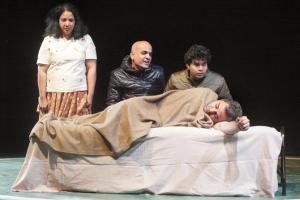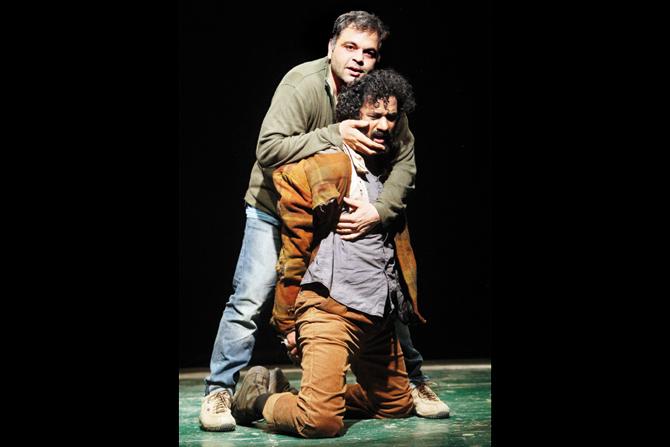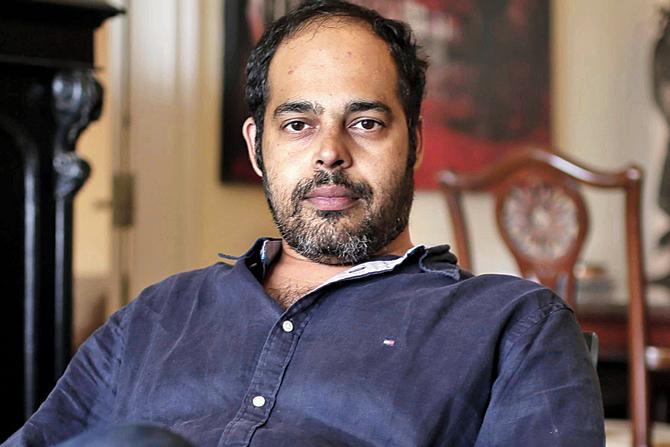When Abraham took his son up to a mountain to offer him as sacrifice, he inspired three world religions. Two thousand years later, he also inspired a play

It isn't polite to say so, but humans are better parents than god. Our children are our sun and our moon. We can't harm a hair on their head. But as our father and holy spirit, god doesn't spare us anything. We live on His watch, and we die on His watch.
ADVERTISEMENT
Christianity, Islam and Judaism are lumped together as Abrahamic religions because they share a birth father, Abraham. He is most well-known for being on the cusp of slaughtering his son, in an attempt to earn god's favour. But when he draws his blade out, god steps in and shuts it down. It's a telling fable, in which god provokes man to be like Him, and man relents.

In 2012, Palestinian playwright Amir Nizar Zuabi set out to discover what happens afterwards. In The Beloved, he explores the irreparable father-son relationship. Theatre director Mohit Takalkar, who has adapted the play into Chaheta, premiering in Mumbai this week, says, "Even though the play is set against the backdrop of religion and the meaning of god, it is a disturbing tale of this completely torn apart and dysfunctional family. In this family, no one trusts each other. The child has to carry the trauma about what happened to him on the mountain throughout his life, about seeing a knife in his father's hand, ready to kill him."
The first Zuabi script Takalkar had adapted was Mein Hoon Yusuf Aur Yeh Hai Mera Bhai, a searing tale of fraternal love and the heart-stopping power of forgiveness, in 2015. It won a clutch of METAs and shook most of its viewers to their core. Takalkar had a similar reaction after absorbing The Beloved. "I was flying to Guwahati [to receive the Ustad Bismillah Khan Yuva Puraskar in 2018]. Because it's a long flight - we had to halt in Kolkata for five hours - I was carrying two plays and one book.

Mohit Takalkar, theatre director
But after reading The Beloved, it was impossible to read anything else. It really took me by my throat." It was also the first time after reading a script, that he couldn't imagine anything. "No visual came to my mind. That really prompted me to investigate further. The writing of it is, in a sense, an extension of Yusuf."
Translated into Urdu by academic Shirin Bismillah, Chaheta is a faithful adaptation, while reflecting the state of affairs in India today. "Once we started working on it, we realised we could easily make it about our country as well. Amir talks about Jerusalem, where the three religions are fighting for the land. And we have Ayodhya, where people are debating the same thing.
In the play, he questions those who claim to talk to god. In July last year, there was the Burari suicide-murder case, in which 11 family members [died in Delhi]. It instantly hit us that the person who initiated them, the elder brother, claimed he was talking to god. He claimed that if you hang yourself, you won't die, because god will save you. It's exactly the same with Abraham's story that, 'I will kill my son, and I know that god will intervene, and I won't have to finish.' So, there was a direct parallel with our contemporary world. All these incidents were leading us to take up the play."
The play questions the role of all religions, not just the big three. "It is talking about today's times and today's faiths. It re-evaluates the myths we live with, and the baggage we carry with them. We are following a certain set of rules because religions command them. If we want to lead a new life, if people want to step into the new world, it's time to shed that baggage and enter the world as a new man or woman."
While the premise is the same, the original myth has about 20-30 versions. In one, god sends a ram as a proxy, in others, a sheep or a lamb. Today's practice of Bakri Eid draws directly from these stories. "Basically, you sacrifice something you have nurtured: it's not about a boy or an animal. If you have tremendous lust and longing for money, you should be able to sacrifice money. You have to sacrifice your most beloved things."
Since god knows the deepest recesses of our heart, He knows the thing we love most is our own flesh and blood. So when it comes to demanding a sacrifice, nothing less will do.
Where: Prithvi Theatre, 20 Janki Kutir, Juhu
When: March 9 and 10
Entry: Rs 350
To book: bookmyshow.com
Catch up on all the latest Mumbai news, crime news, current affairs, and also a complete guide on Mumbai from food to things to do and events across the city here. Also download the new mid-day Android and iOS apps to get latest updates
 Subscribe today by clicking the link and stay updated with the latest news!" Click here!
Subscribe today by clicking the link and stay updated with the latest news!" Click here!






